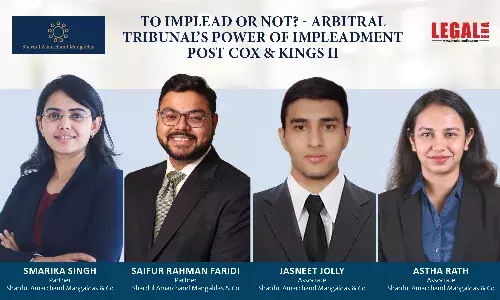The Singapore courts and minimal curial intervention in arbitration

THE SINGAPORE COURTS AND MINIMAL CURIAL INTERVENTION IN ARBITRATION The Singapore courts will be careful to respect and uphold the principle that the courts will not interfere with the decisions of arbitral tribunals, save in limited areas such as matters of jurisdiction or public policy INTRODUCTION 1. Parties at the losing end of arbitration awards have increasingly sought to...
THE SINGAPORE COURTS AND MINIMAL CURIAL INTERVENTION IN ARBITRATION
The Singapore courts will be careful to respect and uphold the principle that the courts will not interfere with the decisions of arbitral tribunals, save in limited areas such as matters of jurisdiction or public policy
INTRODUCTION
1. Parties at the losing end of arbitration awards have increasingly sought to find novel and creative means to avoid complying with arbitration awards that they disagree with. As a major center for international arbitration, the Singapore courts have seen their fair share of applications in which parties have essentially sought to have the courts revisit the merits of tribunals' decisions, albeit through actions framed as applications for declarations or to set aside awards. However, the Singapore courts have repeatedly emphasized that the scope for judicial intervention in the decisions of arbitral tribunals is limited. This article illustrates the approach of Singapore courts, with reference to some recent decisions where Indian parties or interests were involved.
BBA V BAZ1
2. This decision of the Singapore Court of Appeal arose out of the sale of a controlling stake in a company, described as India's largest manufacturer of generic pharmaceutical products, from a group of sellers to a Japanese corporation.2 The majority of the tribunal found the sellers jointly and severally liable to the buyer for more than ₹25 billion in damages for fraudulent misrepresentation.3
3. The sellers sought to set aside the award arguing, amongst others, that the majority of the tribunal, in awarding damages and/or pre-award interest, breached a prohibition in the arbitration clause against awarding "punitive, exemplary, multiple or consequential damages"4. The Court of Appeal, however, refused to revisit how the tribunal quantified damages, emphasizing that even if the majority erred in its approach to quantification (for example, in the majority's understanding of the relevant legal principles or in choosing a discount rate to account for the 'present day value' of money), this went to the substance or merits of the award5.
4. Some of the sellers, bringing a separate appeal, also argued that finding them jointly and severally liable for the full amount of the Award was in breach of natural justice, in excess of the Tribunal's jurisdiction, and/or contrary to Singapore's public policy.
5. The Court of Appeal dismissed these arguments, holding that the majority's finding of joint and several liability did not amount to an egregious error of law or a breach of public policy. The Court of Appeal reiterated that the principle of minimal curial intervention did not permit the courts to correct errors on the tribunal's part,6 and that "mere errors of law do not cross the high threshold of making out a breach of Singapore's public policy".7 The Court commented that these sellers were essentially attempting to recast an error of law as a breach of public policy, and noted that such arguments had been rejected in previous decisions of the Singapore courts.8
HIMALAYA FOOD INTERNATIONAL LTD V SIMPLOT INDIA LLC AND ANOTHER9
6. This decision of the Singapore High Court arose out of an arbitration concerning a joint venture company incorporated in India. The tribunal found for Simplot against Himalaya on the basis that there had been breaches of certain obligations relating to the performance of factory equipment for the processing of potato products. Himalaya sought to set aside the award on the basis that the award dealt with matters not submitted to the tribunal, namely that the tribunal found the equipment had to be capable of producing "quality" products where there were no express warranties in the contract to "quality".10
7. However, the High Court observed Himalaya's position was premised on a particular interpretation of the relevant contract, and Himalaya was asserting that the tribunal could not have interpreted the contract otherwise. This was essentially arguing that the tribunal made an error of law.11 Indeed, the Court stated that Himalaya's application was "a challenge to the substantive correctness of the tribunal's decision; it is a backdoor appeal".12 Before the tribunal, the parties had clearly submitted on the issue of the quality of the potato products manufactured, and therefore it could not be said that the tribunal had decided on an issue outside the scope of the submission to arbitration.13
REPUBLIC OF INDIA V VEDANTA RESOURCES PLC
8. This decision of the Singapore courts arose out of an investment treaty arbitration brought by Vedanta against the Republic of India, which was seated in Singapore. The Republic applied for an order from the Singapore courts that the tribunal permit disclosure of documents from that arbitration into a related arbitration brought by entities in the Cairn Group of companies against the Republic, arguing that disclosure of these documents was required to, amongst others, minimize risk of inconsistent outcomes in these two arbitrations, which both related to the same series of corporate transactions. The tribunal had previously largely dismissed the Republic's applications for cross-disclosure.14
9. In the first instance, the question before the High Court15 was whether the Court should grant declarations that disclosure of the documents from the Vedanta arbitration would not breach obligations of confidentiality.16
10. The High Court declined to exercise its discretion to grant the declarations sought, opining, amongst others, that the declarations would not be persuasive to the tribunal.17 In addition, the Court emphasized that it was "acutely aware of the principle of minimal curial intervention", which it considered as part of Singapore's common law of arbitration.18 The Court considered that since the Republic had already placed and submitted on the issue of confidentiality before the tribunal, the principle of minimal curial intervention was "an especially compelling factor militating against exercising the discretion to grant the plaintiff the declaratory relief which it seeks". Indeed, the Court observed that the Republic had made two applications pursuant to the disclosure regime established in the tribunal's Procedural Order 3.19
11. Upon appeal by the Republic, the Court of Appeal20 held that the High Court correctly rejected the Republic's application, but went even further to hold that, in view of the fact that the tribunal had previously already ruled on the issue of document disclosure and the principle of minimal curial intervention, the Republic's application was an abuse of process.
12. The Court of Appeal noted that permitting parties to seeking court rulings on procedural matters in order for such rulings to be used as a basis for persuading tribunals to reconsider procedural decisions violated minimal curial intervention.21 The Republic had no basis to invoke the courts' jurisdiction since the tribunal had already decided the dispute that the Republic itself had placed before the tribunal. The application therefore had no foundation.22 It was also vexatious in relitigating an issue that had the tribunal had already decided upon, and improperly required the court to render an effectively advisory opinion. The application thus violated the principle of minimal curial intervention.23
CONCLUSION
13. The above is a brief survey of decisions demonstrating that the Singapore courts will be careful to respect and uphold the principle that the courts will not interfere with the decisions of arbitral tribunals, save in limited areas such as matters of jurisdiction or public policy. This is in order to give effect to parties' arbitration agreements by allowing tribunals the latitude to rule on (and even err on) matters within their jurisdiction.
14. By doing so, the Singapore courts are respecting the intent of Parliament that the principle of minimal curial intervention should be encapsulated in Singapore's arbitration legislation. When amendments were made to Singapore's International Arbitration Act to give courts limited power to grant interim measures in support of arbitration, the Minister of Law had explained:
"While this amendment augments the powers of the Court in relation to arbitration, it also places appropriate restrictions on the exercise of these new powers.
It is in line with our policy of minimal curial intervention in arbitration proceedings.
The scope of the new powers is limited to interim measures in support of arbitration, for example, interim injunctions to preserve assets. They do not extend to procedural or evidential matters dealing with the actual conduct of the arbitration itself – like discovery, interrogatories, or security for costs. These procedural matters fall within the province of the arbitral tribunal and must be decided by the tribunal itself. […]
Once the tribunal is able to act, it should be accorded primacy. Accordingly, the amendment makes clear that any order granted by the court may cease to have effect, should an arbitral tribunal subsequently make an order which expressly relates to the previous court order. This is in line with our policy of facilitating arbitration and minimizing judicial intervention in the process.
[This amendment] ensures that our arbitration laws are progressive and will boost our efforts to promote Singapore as a leading venue for arbitration."24
15. It can thus be seen that the courts' decisions are in line with parliamentary intention to ensure that the courts' powers in relation to arbitration are carefully delineated in order that the principle of minimal curial intervention is not rendered nugatory. This policy set out by Parliament and applied by the courts is needed to give contracting parties the certainty that their arbitration agreements will be respected and given effect to by the courts. Ultimately, Singapore's Parliament and courts see this approach as essential towards building a jurisprudence that upholds arbitration as an effective means of dispute resolution, and maintains Singapore's reputation as an arbitration-friendly jurisdiction and a preferred seat for arbitrations.
16. For disputing parties, one immediate implication of the principal of minimal curial intervention is increased certainty, as parties to an arbitration have the benefit of knowing in advance that the chances of a tribunal's award being revised or reversed by the courts is very much reduced. On the other hand, this also means that parties who submit their disputes to arbitration must be prepared to take the good with the bad. If a tribunal makes procedural decisions a party is unhappy with, or even if a tribunal renders an award that a party considers was wrong on the law, there is little room for the courts to revise the award on these grounds alone.
Disclaimer – The views expressed in this article are the personal views of the author and are purely informative in nature.
2 Ibid. at [1].
3 Ibid. at [17]–[18].
4 Ibid. at [30].
5 Ibid. at [40]–[41] and [50].
6 Ibid. at [103].
7 Ibid. at [102].
8 The Court of Appeal noted that this was particular since its earlier decision in PT Asuransi Jasa Indonesia (Persero) v Dexia Bank SA [2007] 1 SLR(R) 597.
9 [2021] 3 SLR 1188.
10 Ibid. at [13] to [16].
11 Ibid. at [2].
12 Ibid. at [33].
13 Ibid. at [16] to [30].
14 Ibid. [17] to [30].
15 Republic of India v Vedanta Resources plc [2020] SGHC 208.
16 Ibid. at [3].
17 Ibid. at [163] to [172].
18 Ibid. at [173] to [174].
19 Ibid. at [175].
20 Republic of India v Vedanta Resources plc [2021] 2 SLR 354.
21 Ibid. at [48].
22 Ibid. at [55].
23 Ibid. at [56].
24 Second Reading of the International Arbitration (Amendment) Bill, 19 October 2009, columns Parliament No. 11, Session No. 2, Volume No. 85, Sitting No. 12, 1628 to 1629.




